Sarah and her gorgeous guide dog Webbly love walking together on the traffic-free paths of the National Cycle Network. Sarah shares why she values these paths so much, along with the challenges she faces in urban areas as a blind person. Sarah also offers advice on how we can all support visually impaired people who walk with guide dogs to make safer and more enjoyable journeys.
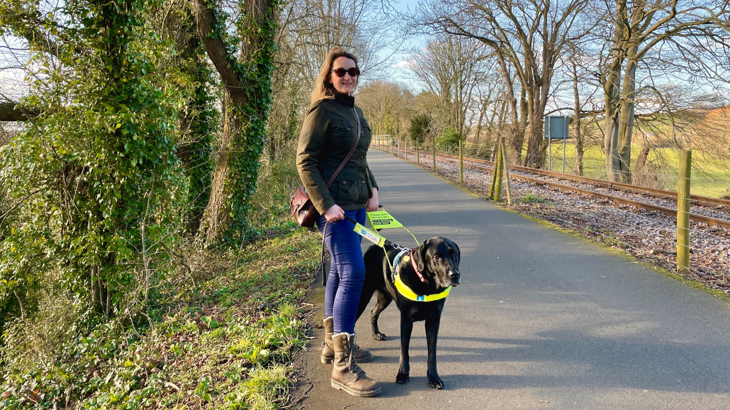
Sarah lost the majority of her sight at 14 years old to a brain tumour.
Sarah is 35 years old and lives in Bristol.
She works within a local authority, ensuring that young people with special educational needs have access to the learning support they require in schools.
Webbly is 6 years old and he lives with Sarah.
He works as her guide dog, helping Sarah to safely navigate the world outside of her home.
Sarah was fully sighted until the age of 14 when a brain tumour severely impacted her vision.
She was registered blind in her teens and further tumours in adulthood have continued to reduce her extremely limited amount of residual vision. Sarah said:
“It’s hard to explain what I can and can’t see.
“But it could be described as a kind of unclear tunnel vision as I have no peripheral vision.
“A doctor once suggested that the clarity of vision that a fully sighted person has of an object that's 60 meters away is comparable to the clarity that I'd have if that same object was only one meter away from me.”
What does it feel like to walk with a guide dog?
We met Sarah and Webbly on a crisp and sunny March afternoon on the Bristol and Bath Railway Path, National Route 4 of the National Cycle Network.
Webbly was full of excitement, wildly wagging and grinning from ear to ear.
“He’s really just an ordinary dog when he’s not on the harness working” remarked Sarah.
It’s a helpful reminder that guide dogs aren’t fundamentally different to other dogs.
Though they have been trained to undertake remarkable tasks and exercise incredible control in support of their owners.
We asked Sarah what it’s like to walk with Webbly on the harness.
“It’s like taking someone’s arm because Webbly can think for himself and steer us around hazards.
“He gives me the headspace to relax whilst walking.
“I can enjoy my surroundings, take a phone call on the move or think about what’s coming up next that day.
“Simple things that I totally took for granted as a sighted person.
Sarah explained that walking with a guide dog is a totally different experience to walking with a cane.
“I personally find canes such a pain in the bum and feel so vulnerable and stressed when using mine.
“I'm sure some people are cane-prejudiced or they simply don’t understand what they are.
“It's as though they think I've got some kind of metal detector or litter picker.
“It's inevitable with a cane that you'll accidently knock people’s feet sometimes and I've had real aggression thrown at me when this happens.
“Webbly commands a much warmer reception out in public, he also occupies and clears a significant physical space for us both.
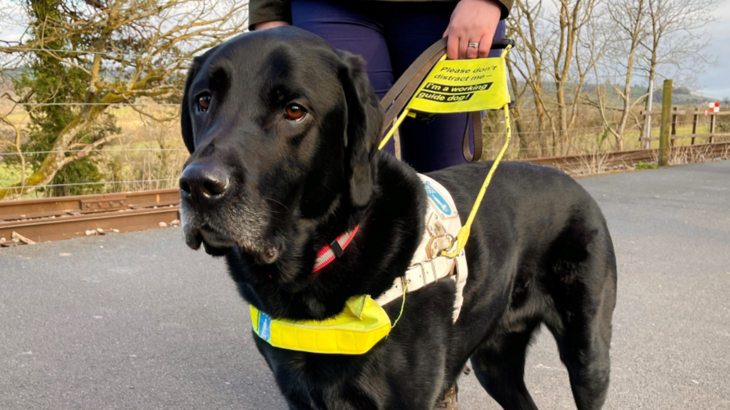
Webbly the guide dog helps to make Sarah's day-to-day walking trips safer and more relaxing.
Why is the National Cycle Network great for walking with a guide dog?
Sarah told us that the National Cycle Network (the Network) is the perfect place for her and Webbly to walk together.
To understand what makes it so special, we asked Sarah to talk us through her reasons.
She began by talking about the physical characteristics of traffic-free paths.
“Living in the South West, I get to enjoy lots of paths which are former railway lines.
“These tend to be straight, flat and fairly predictable, which makes Webbly’s job really easy.
“It also helps if other path users can see us ahead, so straight paths give a great line of vision to sighted people.
“I know the Network isn’t perfect, sometimes I’ll catch my foot on a pothole or my hair on a low hanging branch.
“But on the whole (and by comparison to the rest of the outside world), the Network is brilliant for me.”
Sarah then spoke about her love of rural paths.
“I grew up in the countryside and absolutely love walking there.
“But without someone sighted like my husband or a friend to take a long-distance view and pick a sensible route across a field or through a woodland, the surfaces are just too unpredictable.
“The beauty of the Network is that it takes me to nature on a straight, flat surface.”
We then discussed how traffic-free paths affect Webbly.
“I think a lot of people don’t realise that guiding me all day is mentally tiring for Webbly and he needs down-time.
“Railway paths are a treat for him, because although he’s technically working on the harness, it’s a very untaxing environment for him.
“These paths also lend themselves to doing out-and-back walks, so Webbly can just retrace his steps on the return leg.
“It’s a chance for us both to relax, listen to bird song and unwind.
Finally, we asked Sarah how walking on the Network makes her feel.
“So good because I can be independent, which is great for anyone’s self-worth and esteem.
“But even with friends and family, traffic-free paths are a great place for me to walk and socialise.
“I don’t feel that I have to cling onto someone's arm the whole time if Webbly’s enjoying some normal dog time on a conventional lead, rather than his working harness.
“I can just walk in a straight line and keep pace with whoever I’m chatting with.
“And when Webbly’s harness comes off, you’ve got a regular Labrador on your hands, whose top priority is sniffing the ground and not looking where he’s going.
"But he's more than earned his 'me time'."
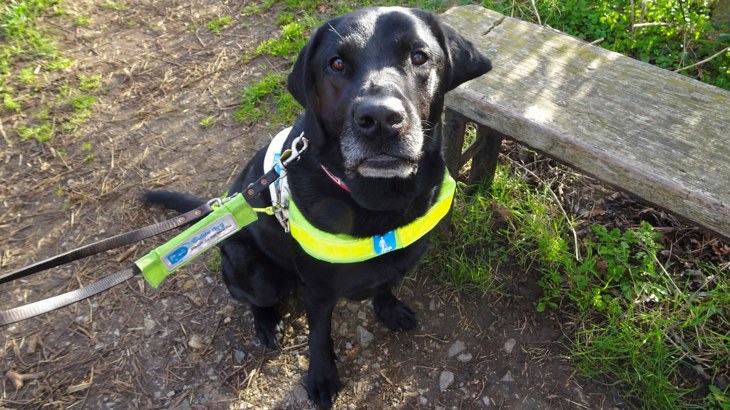
Webbly loves traffic-free railway paths because their straight, flat and predictable nature are super easy for him to navigate.
Where do you love to walk in the South West?
We asked Sarah where her favourite local places to walk on the Network are.
“I love the Two Tunnels (National Route 244/24) just outside of Bath, because it transports you from the city to the countryside in no time at all.
“The combination of the audio art installation inside the Coombe Down tunnel and the sounds of the countryside outside are just a lovely soundtrack to a walk.
“The Bristol and Bath Railway Path (National Route 4) has some great sculptures which can be appreciated by touch.
“And Colliers Way (National Route 24) near Radstock seems to be alive with wildlife all year round.
“My friends know that I love art, so we’ll talk about the unusual installations on this line too.
“Thinking beyond me and my sight, I really feel that the National Cycle Network has something to offer everyone.
“Anyone can get active on the paths, there’s no fee to be a part of this community, you just have to show up.
“People stop and chat to say hello to one another, it’s a really nice community vibe.”
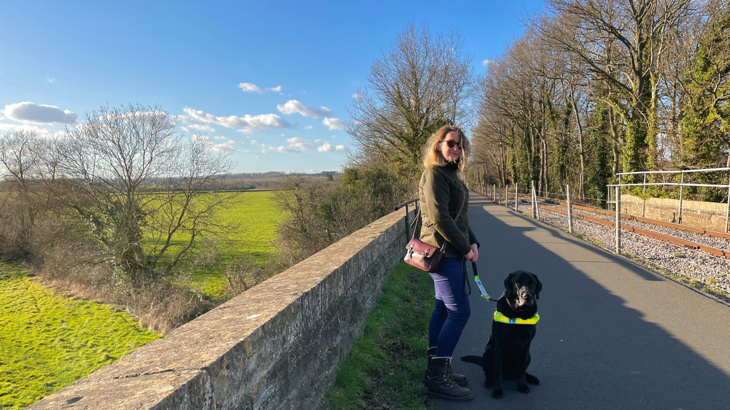
Sarah and Webbly enjoy the Bristol and Bath Railway Path, one of their favourite routes to walk.
How could the National Cycle Network be improved for blind and visually impaired people?
We asked Sarah how she’d like to see the Network improved.
“Some audio facilities would be great.
“For instance, you could have signposts at path exit and entry points that are motion activated to give audio guidance, for example 'Exit for Saltford in five meters'.
“Audio buttons on interpretation boards, artwork or benches could also enable blind and visually impaired people to hear about the history and context of the location.
“It’s about dignity and independence.
“I might need someone to help me locate the audio button, but that’s a very different request to asking them to read the whole board aloud to me.
Up until this point, we’d been talking exclusively about walking on the Network.
Sarah then revealed that she’s also been cycling on it.
“Since losing my sight, there aren't many land-based physical activities that I can do which have an element of speed, like running or roller skating.
“So every time I get to ride a tandem with someone it’s absolutely brilliant.
“Because that fast feeling of the wind in your hair is so exhilarating and missing from my life most of the time.
“This leads me onto one major suggestion for how Sustrans could improve the Network, and that's to sort out the nightmare barriers.
“Not only are tandems massive, they're super heavy to lift.
“So please keep removing and redesigning barriers for all of us on outsized cycles.
“Overall though, when it comes to the parts of the Network that I walk on locally, I can only say ‘keep up the good work’.
“I appreciate that consistent path surfaces and trimmed hedges don’t just happen and it must take a lot of maintenance to keep on top of this.”
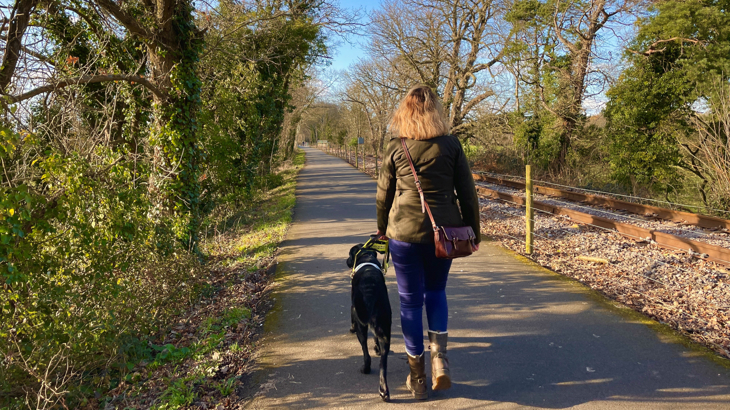
Sarah's lived experience offers us valuable insights into how we could improve the National Cycle Network for blind and visually impaired people.
What are the challenges of walking in towns and cities with a guide dog?
Next, we talked to Sarah about her experience of walking journeys in urban environments.
“It’s such a different ball game for me and Webbly, compared to walking on the National Cycle Network.
“The key issue is that towns and cities are often designed in ways which are incompatible with the two principles on which guide dogs operate:
1. They need to follow straight lines. So that’s either curb stones or a building line.
2. They're trained to move around obstacles, putting themselves between their owner and the obstacle.
“Often in pedestrianised shopping streets the curb stones have been removed, so Webbly (like all guide dogs) really struggles to navigate.
“The alternative is for him to walk the building line, but this can be a bit perilous for us both, because people rush in and out of shop doors.
“What Webbly really needs is a visual line, like a line of bricks or slabs laid into the surface of the street to replace curb stones.
“So long as they’re of a contrasting colour, he can usually pick them up.
“I have experienced lines of textured bricks but found that if they’re not a different colour as well, none of my dogs have been able to follow them by texture alone.
“The absence of curb stones also really impacts walking with a cane, and I don’t personally find textured surfaces as effective.
“Having said that, I totally appreciate that curb stones must be awful for people with mobility issues.
“It’s really difficult meeting everyone's needs and I don’t envy the challenge that street designers face.
“Poor drainage on streets is also really challenging as most guide dogs won't walk through water.
“Equally, they don’t have the decision-making capacity to reroute you, leaving them a bit stumped about how to solve the problem.
“I also can’t talk about high streets without talking about A-boards and what a total nightmare they are.
"For me, walking with a cane, they're just a classic embarrassing trip hazard which bruises your legs and your self-esteem.
"For Webbly, they often present a stressful dilemma.
"Because he's already navigating a lot of valid obstacles, like benches, bins, and pop-up stalls.
“When there's too much street furniture, he reaches a point of overwhelm and he doesn’t know how to pick his way through.
“Webbly is amazing but he’s not a strategist, he’s a Labrador.
"A one-problem-at-a-time kind of guy.”
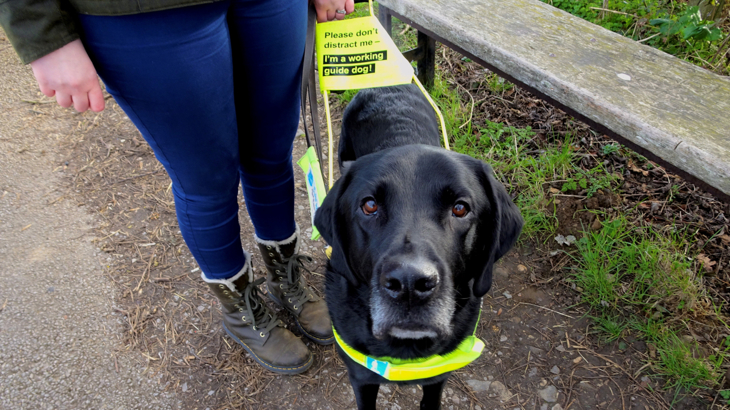
As well as supporting Sarah to walk in the countryside, Webbly also guides her in towns and cities, which makes significant demands of him.
Sarah’s top tips for supporting people with guide dogs to make everyday journeys with ease
- Please don’t distract guide dogs: And that includes offering treats when they’re off the harness. Even though it seems polite to ask, it can make owners feel guilty to turn pats and treats away. Guide dogs are trained to have a different relationship with treats but rest assured, they get to kick back at home after work and receive plenty of off-duty food and love.
- Please don’t drop food waste: Guide dogs are still dogs who are ruled by their tummies. Food litter distracts them from their work, causing them to make mistakes. In the long term, if they start to think that they’ll ‘get lucky’ and find food whenever they go out, their guide dog training gets eroded as the desire to scavenge takes over. Which puts both dogs and owners at risk. Owners also can’t see what dogs are eating, so the risk of fatal poisoning from foods like chocolate or grapes is much higher.
- Please don’t drop chewing gum: When guide dog owners are sat in public spaces, such as bus shelters or parks, their dogs may lie down and take a quick break. It's in places like these that gum frequently gets stuck in the dog's belly fluff, which is horrible for both them and their owners.
- Please don’t be too subtle: If you can see someone walking ahead with a guide dog or cane and you need to overtake or pass by, please just say “Hello, excuse me” or ring a bike bell in advance. Assume that the person doesn't know that you’re approaching.
- Please be good-natured if guide dogs or canes bump into you: It’s never the intention.
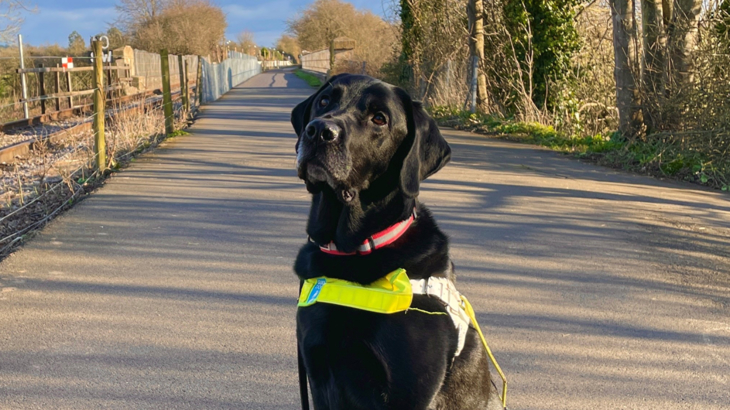
Webbly will appreciate you helping to keep him and Sarah safe.
Working better for everyone
Our thanks go to Sarah and Webbly who generously took the time to meet us for a walk and talk on the Bristol and Bath Railway Path, National Route 4.
Here at Sustrans, we want the Network to be safe and accessible for everyone.
By hosting conversations with people who hold a diverse range of lived experiences, we hope to learn how we can deliver projects which make it easier for everyone to walk, wheel and cycle.
Being for everyone isn’t a box we can tick and we can’t be complacent or merely compliant.
We have to keep asking questions, listening hard and exploring how we can work better for everyone.






